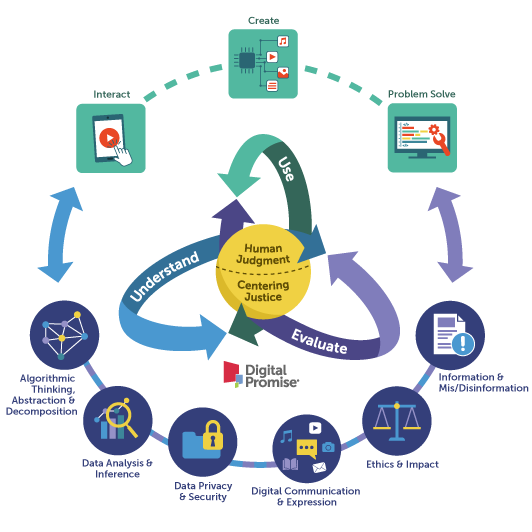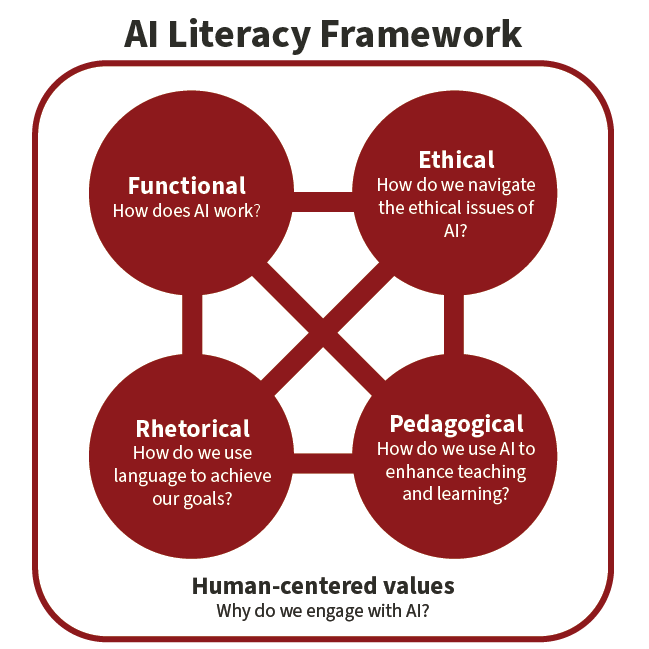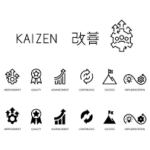AI Literacy in Schools 2025: Preparing Students for the Future?
Table of Contents
In an era where artificial intelligence (AI) is reshaping industries and daily life, equipping students with AI Literacy in Schools has become essential. Integrating AI education in schools not only prepares learners for future careers but also fosters critical thinking and ethical understanding.

What Is AI Literacy?
AI literacy encompasses the knowledge and skills required to understand, evaluate, and effectively use AI technologies. It involves
- Understanding AI Concepts: Grasping the fundamentals of how AI systems operate.
- Evaluating AI Applications: Critically assessing the use and impact of AI tools.
- Using AI Tools: Effectively interacting with AI applications in various contexts.
This literacy enables individuals to navigate an increasingly digital world responsibly and ethically.

Why AI Literacy Matters in Today’s World
AI technologies are deeply integrated into various aspects of life, from virtual assistants to recommendation algorithms. Understanding AI is crucial for:
- Career Readiness: Preparing for jobs that increasingly require AI proficiency.
- Informed Decision-Making: Making choices in a society influenced by AI-driven data.
- Ethical Awareness: Recognizing and addressing the ethical implications of AI use.ScienceDirect+2ScienceDirect+2DataCamp+2
As AI continues to evolve, fostering AI literacy ensures that students are not just passive consumers but active, informed participants in the digital age.
Benefits of Teaching AI in Schools
Incorporating AI education into the school curriculum offers several advantages:
- Enhanced Critical Thinking: Students learn to analyze and question AI outputs, fostering deeper analytical skills.
- Creativity and Innovation: Engaging with AI tools can inspire creative problem-solving and innovation.
- Personalized Learning: AI can tailor educational experiences to individual student needs, improving learning outcomes.
- Ethical Understanding: Discussing AI’s societal impact promotes ethical reasoning and responsibility.
These benefits collectively contribute to a more adaptable and forward-thinking student body.
Challenges in Implementing AI Education
Despite its importance, integrating AI literacy into schools faces several hurdles:
- Resource Limitations: Many schools lack the necessary infrastructure and tools to teach AI effectively.
- Teacher Training: Educators may require additional training to confidently deliver AI-related content.
- Curriculum Development: Creating age-appropriate and comprehensive AI curricula can be challenging.
- Ethical Concerns: Addressing issues like data privacy and algorithmic bias is essential but complex.
Overcoming these challenges requires concerted efforts from educational institutions, policymakers, and communities.
How Schools Can Start Teaching AI
To effectively introduce AI literacy, schools can consider the following strategies:
- Integrate AI Topics into Existing Subjects: Incorporate AI discussions into science, technology, engineering, and mathematics (STEM) courses.
- Utilize Interactive Tools: Employ platforms like Google’s Teachable Machine or Scratch to provide hands-on AI experiences.
- Collaborate with Experts: Partner with organizations and professionals specializing in AI education to enrich learning.
- Promote Project-Based Learning: Encourage students to undertake projects that involve building simple AI models or applications.
These approaches can make AI concepts more accessible and engaging for students.
Resources & Tools for AI Education
Several resources are available to support AI literacy in schools:
- Teachable Machine: A user-friendly platform for creating machine learning models without coding.
- Scratch: A visual programming language that can introduce AI concepts through interactive projects.
- AI4K12 Initiative: Provides guidelines and resources for AI education tailored to K-12 students.
- Google AI Experiments: Offers a collection of simple experiments to explore AI capabilities.
Leveraging these tools can enhance the effectiveness of AI education initiatives.
The Role of Teachers & Parents
Educators and parents play a pivotal role in fostering AI literacy:
- Continuous Learning: Teachers should seek professional development opportunities to stay updated on AI advancements.
- Supportive Environment: Parents can encourage exploration of AI topics at home, reinforcing school-based learning.
- Open Dialogue: Both teachers and parents should engage in conversations about the ethical and societal implications of AI.
A collaborative approach ensures that students receive consistent support in developing AI literacy.
The Future of AI in Classrooms
Looking ahead, AI is poised to further transform education:
- Adaptive Learning Systems: AI-driven platforms will offer increasingly personalized educational experiences.
- Automated Administrative Tasks: AI can streamline grading and administrative duties, allowing teachers to focus more on instruction.
- Virtual Classrooms: Enhanced by AI, virtual learning environments will become more immersive and interactive.
Embracing these developments requires proactive planning and investment in AI literacy today.
Conclusion
AI literacy is no longer optional; it’s a fundamental component of modern education. By integrating AI concepts into the curriculum, providing access to relevant tools, and fostering an environment of continuous learning, schools can prepare students to navigate and shape a future increasingly influenced by artificial intelligence.










